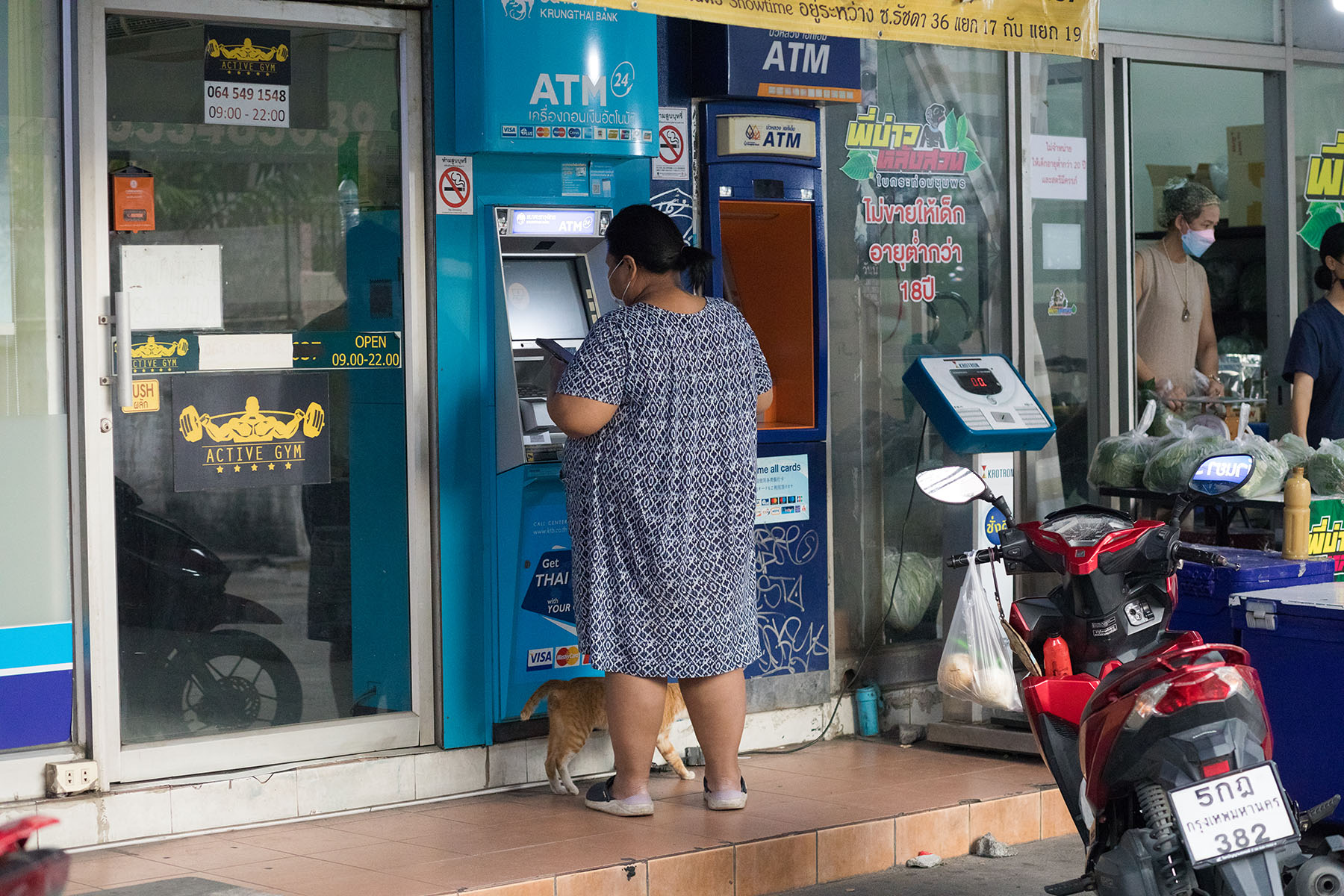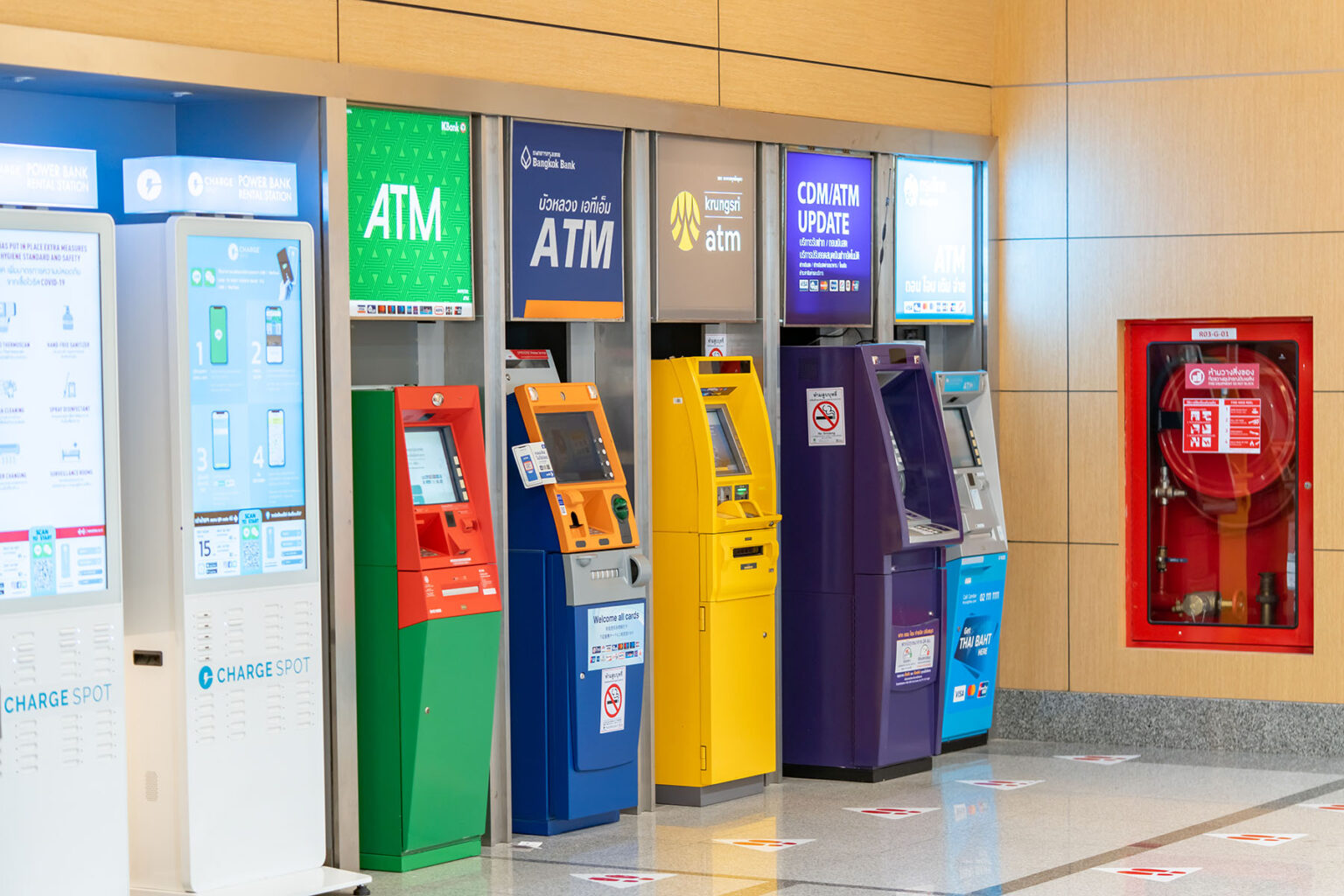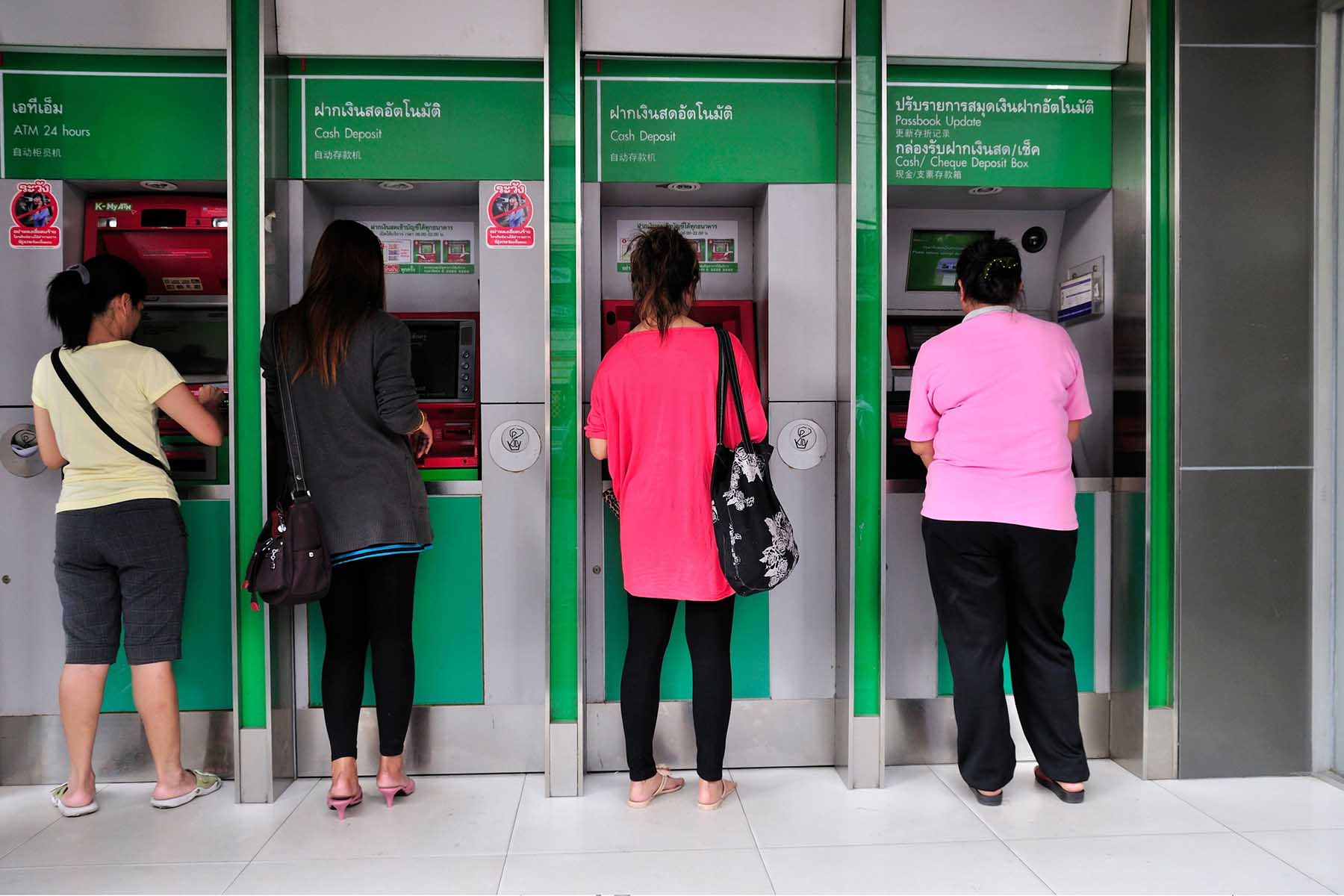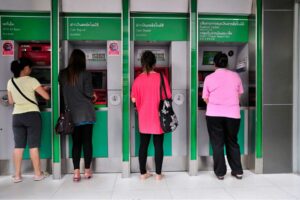The Thai banking system can be bewildering to both newcomers and born-and-raised citizens. Sometimes it feels like a labyrinth of arcane rules and mysterious whims, where one branch of a bank has a completely different policy from the next. So what should you do if cross-border banking isn’t an option?
Read on for the best tips for navigating the Thai banking system:
- Quick overview of banking in Thailand
- How to open a bank account in Thailand?
- Do you even need a bank account in Thailand?
- Types of bank accounts in Thailand
- How do you choose a Thai bank account?
- How to manage a bank account in Thailand
- Changing banks or closing a bank account
- What should you do if you’re refused an account?
- Useful resources
Quick overview of banking in Thailand
There are around 30 banks in Thailand, both domestic and foreign. The governing body for the sector is the Bank of Thailand (BOT – ธนาคารแห่งประเทศไทย), which controls the Financial Institutions Policy Committee (FIPC). Although this might sound very well-regulated, each bank has its own interpretation of BOT policy. Sometimes, that interpretation can even change from branch to branch.

Banking often takes a few clicks of a button in other countries. In Thailand, however, you’re required to go to your local branch in person. In fact, the country considers digital banking still a new phenomenon, and it’s not yet available. That said, the BOT has granted permission to create the first virtual banks in Thailand from 2024 onwards.
Is banking in Thailand safe?
Money and savings in Thailand are covered by the Thai Deposit Protection Agency Act. That means if your bank goes bankrupt, you can still get your money back up to a certain amount. The Thai Savings Guarantee protects up to a maximum of ฿1 million baht per person per bank. The guarantee only applies to funds in Thai Baht, not to other currencies or e-currencies.
How to open a bank account in Thailand?
Regular accounts for expats
Opening a bank account in Thailand can be extremely frustrating for foreigners, as each branch has its own particular criteria. To be on the safe side, it’s a good idea to bring some additional information. Even if a bank posts a list of required documents on its website, you never quite know what the teller will ask for.
In general, you’ll need to bring the following:
- Your passport
- Your certificate of residence
- Proof of residency in Thailand (e.g., a rental agreement or a Thai driver’s license)
- If you are a student, your student visa
- If you are working, your work permit
- A letter from your employer which confirms your job title and your employment status in Thailand
- A minimum deposit, usually in the region of ฿1,000 to ฿3,000
You may also need to provide a reference from your embassy and one from your bank in your home country. Sometimes, your bank may also request that your embassy notarize your passport first.
Naturally, you’ll need to visit your branch to complete the process. Once you’re a bank customer, you may be able to open other basic accounts online.
As long as you bring all of the branch’s required documents, your account should only take around an hour or so to open.
Corporate bank accounts
If you’re self-employed or starting a business, you’ll probably need a corporate bank account. Some banks only allow Thai citizens to open a business account, so you may need to shop around. It’s worth asking experienced friends for advice about which bank to choose.

Similar to before, the paperwork requirements will vary from branch to branch. However, the standard things you’ll need to provide tend to include:
- The company’s registration certificate
- Stamped minutes of the board meeting that clearly authorize the opening of the account and confirm the designated signatories
- The company’s tax ID card
- The passport or ID card of every member of the board of directors and every shareholder with more than 25% of the company
- A list of shareholders
- A minimum deposit
In addition, the bank may ask for additional documents. In theory, only some of your board of directors members need to go to the branch in person but don’t be surprised if your bank asks them all to attend.
How to open a bank account for children
A few banks, such as Bangkok Bank, offer special kids’ accounts. These are available for children aged 14 and under, with higher interest rates than standard accounts.
If one of the parents is a Thai national, they must present their citizen’s ID card, the child’s birth certificate or ID card, and a few other supporting documents. If both parents are foreign nationals, they must go to the bank in person to check specific requirements.
Do you even need a bank account in Thailand?
You can easily get by in Thailand without opening a local bank account. However, long-term residents will benefit from getting one. For example:
- Your home bank may charge you for using Thai ATMs
- If you lose your international card, it will take longer to replace
- Unless you have a multi-currency account that supports the Thai baht, you’ll have to pay exchange fees every time you use your international bank
Moreover, if you’re working in Thailand, your employer might insist you open a local bank account as most companies require one for their payroll department.
Money management before opening an account
Thailand is an extremely popular tourist destination, so international credit and debit cards are common. Mastercard and Visa are accepted pretty much everywhere in the country. However, check with your bank at home before you travel. You might also want to notify them of your plans, as some banks are quick to block cards that are used in an irregular way.

In general, it’s a good idea to carry cash in Thailand, as most taxis and some vendors don’t take cards (international or domestic) for small transactions. Keep in mind, however, that ATMs usually charge a standard ฿220 per withdrawal. Your own bank in your home country may also charge fees for using a foreign ATM. That means taking out a large sum of money in one go is more cost-effective.
Types of bank accounts in Thailand
The kinds of bank accounts that you’ll typically encounter in Thailand include:
Savings account
A Thai savings account is the equivalent of a current account in other countries. It does not have any high interest rates or special savings features. It’s the account you’ll likely use for all your day-to-day needs. Many expats in Thailand choose to open a standard savings account and don’t bother with anything else.
Current account
A current account is a savings account that comes with a checkbook. You’re unlikely to ever use it, so you may not want to bother opening a current account. It will make no difference to your daily life in Thailand.
Fixed-term account
A fixed-term account allows you to store money with the bank for a pre-arranged or fixed length of time. At the end of that period, you can access your money again, plus interest. If you need to take money out of the fixed-term account before the time is up, you’ll be penalized with a fine.
While Thailand generally has relatively high interest rates, banks often offer a different rate for citizens than foreigners. A fixed-term account may not be the best choice for an expat, and you might want to look elsewhere if you’re considering investing money.
Non-resident accounts
Offshore banking is only a small part of the Thai banking sector, but some banks in Thailand will allow you to open an account with just a tourist visa. This is treated as a non-resident account.
In practice, it functions the same way as a resident account, with one important difference: transferring money between a Thai account and a non-resident account will be treated as an international transaction. This means processing will take longer, and you’ll face higher fees.
How do you choose a Thai bank account?
When opening a bank account, you’ll want to consider prices and fees, the range of services available, ease of access, digital banking options, coverage by the Deposit Protection Agency, and whatever else you prefer.
If you’re working in Thailand, your employer might recommend a particular bank, usually the one the company uses. This can mean a faster transfer on payday, and the bank may also be familiar with expat workers.

One factor that’s far more important in Thailand than in other countries is the branch. Thai bank branches often operate different policies, so you can have a different experience from one branch to the next.
Some are more lenient, while others interpret the BOT’s rules and regulations more strictly. Some are more familiar with foreigners and have English-speaking staff, while others do not. It’s worth asking fellow expats, particularly those who’ve been in Thailand for a long time, for recommendations.
Many foreigners underestimate the importance of individual branches. Unlike in other countries, in Thailand, you’ll find there are some services you can only access at your particular branch. That makes it one of the most essential things to consider when opening a bank account.
Banking services in Thailand
When you open a bank account in Thailand, you’ll usually get a debit or ATM card and an old-fashioned bank book. Make sure to keep the bank book safe, as it’s essential to regular banking.
The bank will give you very little else. Many more advanced parts of the banking system have strict gatekeeping, which means foreigners are effectively barred from them. For example, you need to be a customer of the same bank for several years before they will issue you a credit card, and mortgages for expats are often just out of reach.
International money transfers
International money transfers (การโอนเงินระหว่างประเทศ) at a Thai bank take time and effort, as you usually have to go to your branch in person. The bank may also require you to sign up for their outward remittance service. This involves providing your work contract or pay slips to prove your source of income.
The Thai government limits the amount you can transfer out of the country to US$50,000 a year. It can take up to five working days to process.
Many expats prefer to use other services to make international transfers. These are usually faster, cheaper, and involve significantly less hassle. Better still, you can complete your transfer online, so there’s no need to trek down to your nearest bank branch.
Some of the most popular platforms for international transfers include:
Mobile banking in Thailand
As said before, mobile banking is still in its infancy in Thailand. There are currently (2023) no fully digital banks, although the Bank of Thailand has approved some to be created in the coming years.

All banks now have an app for you to use, and it’s easy to gain access once you’ve opened a bank account. However, the range of services in the app is not as wide as you are used to in other countries. For example, you can use it to make domestic payments and transfers. However, you may not be able to carry out international transfers.
How to manage a bank account in Thailand
The most common way to deal with your bank account is by visiting the branch. While you won’t need to make an appointment, there can sometimes be very long lines. Remember to bring your bank book and your ID. A number of services are only available at your particular branch, so going anywhere else may result in frustration.

Local expert
Jane Evans
Insider tip
Most companies in Thailand pay on a monthly basis, with the last Friday being the most common payday. This means that, if you go to the bank that day, you’ll likely be standing in line for a while.
ATMs in Thailand have more functions than in other countries. You’ll have to use an ATM belonging to your own bank, but you’ll be able to make transfers, pay bills, and withdraw money.
To some extent, you can also manage your bank account online. If your banking app does not have that many functions, try using the website instead. Be aware that some services are completely unavailable online.
For example, some banks offer multi-currency accounts, allowing you to hold US dollars in Thailand. However, you’ll need to go to your branch whenever you want to do anything with your USD balance.
Changing banks or closing a bank account
To close a bank account, you must visit your local branch in person. Once again, the staff might ask you for a number of documents to prove your identity. The process is quick as long as your balance is zero. Some bank accounts may have a penalty fee if you close your account within six months of opening it.
If you leave Thailand, you must still close your account in person. However, in many cases, when your bank account’s balance remains at zero for more than a year, it will expire automatically.
What should you do if you’re refused an account?
Can you open an account if have poor credit?
You can open a basic bank account in Thailand if you have poor credit. You won’t be able to get a credit card or a loan, but those are quite difficult for expats in Thailand, regardless.

What if you are refused a bank account in Thailand?
When a bank branch refuses to open a bank account for you, the simplest option is to go to another branch. There isn’t much cross-branch communication in Thailand, so you’re not likely to be blacklisted by the entire bank. You can also report the bank to the Complaint Center for Foreign Investors, which allows expats to lodge complaints (anonymously if necessary).
If you’re still unable to open a bank account in Thailand, you may want to consider cross-border banking instead. That way, you can manage your money in another country while you’re living in Thailand.






